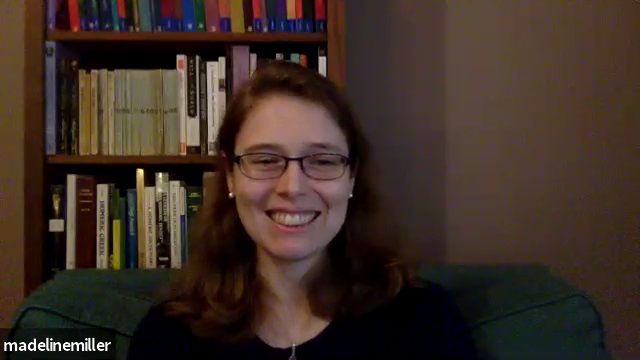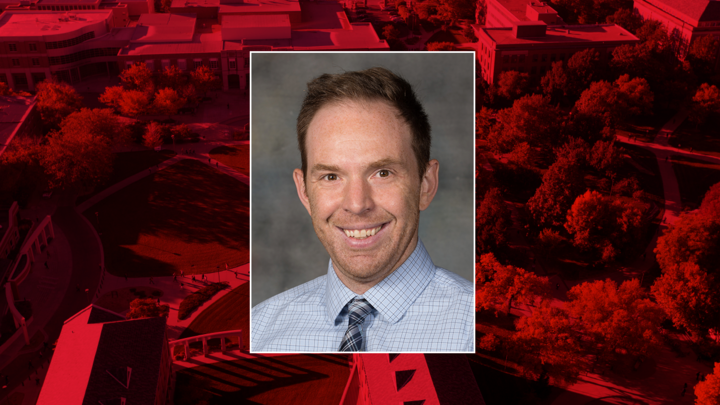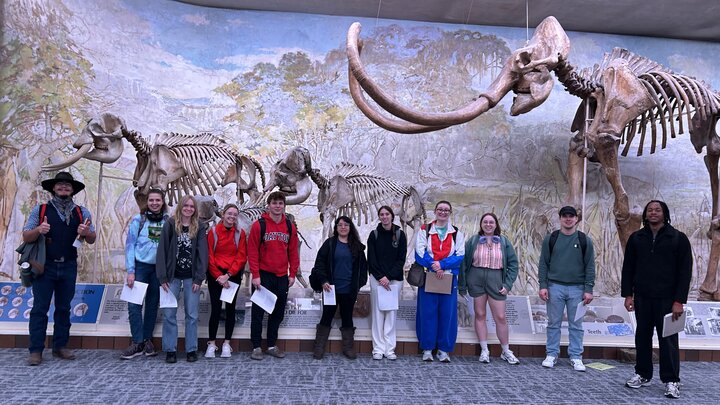Madeline Miller, the author of the bestselling novels Circe and The Song of Achilles, joined the course “Women in Classical Mythology” on Zoom on March 29. Students in the class read Circe before meeting with Miller. The seminar, which coincided with Women’s History Month, gave students a chance to ask her questions about Circe and to discuss the process of adapting myths to highlight the agency of female characters.
Miller earned a B.A. and M.A. in Classics from Brown University. Circe has won several awards and is being adapted into a television series. She also wrote The Song of Achilles, exploring the relationship between Achilles and Patroclus, which was also a bestseller and won the Orange Prize for Fiction. Additionally, Miller has more than fifteen years of experience with teaching the Classics and Shakespeare.
“Women in Classical Mythology” is a new course that applies feminist perspectives to study portrayals of female mythological figures. Students study ancient sources for classical myths as well as modern adaptations. Additionally, they produce their own creative projects highlighting the agency of female characters.
After studying literary and artistic representations of Circe, who famously turned Odysseus’ men into pigs in The Odyssey, the class read and discussed Miller’s Circe. The novel reimagines the story of the mythic sorceress from her perspective while exploring her relationships with other mythological characters.

Author Madeline Miller on Zoom.
Students in the class began by discussing their creative projects with Miller and sharing their thoughts on her book. Miller offered each student individualized feedback and advice about the creative process and sources for the myths that they are adapting. For example, several students are writing journals from the perspectives of female characters, and Miller commented on how this medium makes it possible to feel close to the material while creating suspense. She also talked about how authors had changed aspects of mythic stories.
After chatting with each student individually, Miller offered advice for the class about adaptations, explaining that it is possible to stay close to the ancient sources or to reinvent the stories.
“You should feel free to change, adapt, whatever you want to do, so I empower you to go," she said. "Go wherever the heat is, wherever your mind is taking you.”
Additionally, she encouraged the students to continue their work.
“I love hearing all of your stories and how you’re going to tackle these myths," she said, "because I think one of the things about these myths is that they can be so frustrating, even as they’re so wonderful to read you know the absences, the way the story gets forced into a particular retelling or version, so I love that you guys are just exploding those versions with your own ideas and your own creativity...Keep doing it.”
After giving the students advice about adapting ancient myths, Miller spoke about how she became interested in Circe and decided to write her story. Miller explained that when she first read the story of Circe from The Odyssey in eighth grade, she felt “let down by it” because of Circe’s lack of agency.
“I think it’s important to ask ourselves who is telling the story and whose story is really being told, and so you know when you’re looking at almost all of these stories, with the exception of Sappho and very few other voices from the ancient world, we are talking about male aristocrats who are telling the story,” she remarked.
She explained that in The Odyssey the story is filtered through the perspective of the male hero Odysseus, and this is symptomatic of how ancient sources privilege male perspectives. Over time she realized that Circe is actually a much more complex and powerful character, and sought to reclaim her agency.
“I thought, you know, I’m going to take a woman’s life, which is typically not seen as important enough for epic, and I am going to give it the epic treatment,“ she said.
Miller also took questions from the class. She answered questions about how the experiences of adapting the stories of Achilles and Circe were different, and also explained how she portrayed Circe’s relationships with her siblings and her friendship with Penelope.
She explained that while Circe has a troubled relationship with her sister Pasiphae at the beginning of the novel, “she comes to realize that her sister is dealing with a lot of the same things that she is dealing with.” She also commented that “so much of the novel is about Circe longing for community and, in particular, female friendship.”
When explaining how she portrayed the rapport between Penelope and Circe, she said: “They are survivors, they were both single parents. They’re complicated people. They are also different: Circe is much more open than Penelope is.”
Class discussions have talked about why it is important for women to support other women, and it was really helpful to hear Miller’s perspective on Circe’s relationships with other female characters. It was inspiring to hear her thoughts on interpreting and adapting ancient sources to reclaim the agency of female characters. She encouraged everyone to be creative and to question the gendered characterizations that we see in the mythic narratives.
Everyone in the class appreciated that she took the time to chat about Circe and the students’ original adaptation projects. She is incredibly knowledgeable about classical myths and modern adaptations, and was generous about sharing her experience with the class in a supportive way.
Morgan Palmer is an assistant professor of practice in the Department of Classics and Religious Studies. Author photo by Nina Subin.



